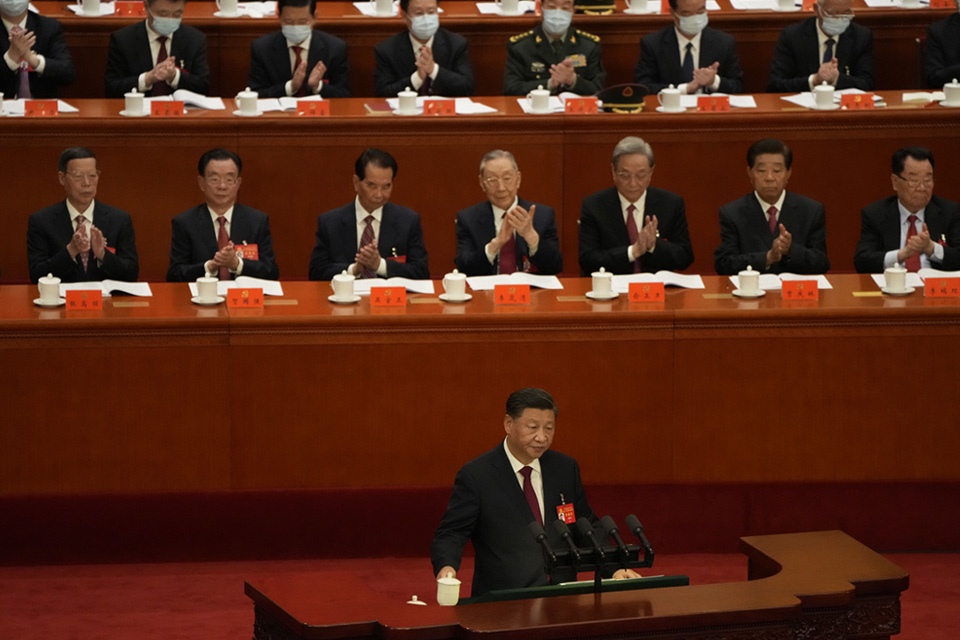Memo Published November 15, 2022 · 6 minute read
Behind the Curtain: Five Things You Missed at the 20th Party Congress
Jessica Greely

The National Party Congress is the primary venue for the Chinese Communist Party (CCP) to announce changes to party leadership. Held every 5 years, the National Party Congress elects the Central Committee, a committee made up of 205 delegates that sets and directs the party’s core objectives throughout its five-year term, along with the 24-member Politburo and seven-member Standing Committee. The National Congress also adopts plans and special programs that determine the country’s trajectory over the next five-year term.
As was widely reported, Xi Jinping clinched a precedent-breaking third term as General Secretary of the CCP as well as Chairman of the Central Military Commission.
Also in the news was the unscripted removal of former premier Hu Jintao. But like much coverage of China, a lot happened that did not receive much attention from Western audiences. For example, the party’s leadership underwent a widespread transformation, with nearly two-thirds or 246 out of 376 total members replaced for the party’s Central Committee.1 The Politburo and Standing Committee both saw drastic shifts as well, with turnover rates of 54% and 57% respectively. Members on both the Politburo and the Standing Committee who were seen as potential rivals to Xi’s power have been eliminated.2 Formerly the second-most powerful official in China, notable rival Li Keqiang was also replaced by a Xi loyalist.
Below are 5 observations from the Party Congress that are significant and underreported.
1. Personnel Shifts Highlight National Security and Taiwan
The makeup of the new Politburo and Standing Committee includes leaders from the country’s space and sciences sectors, economic sector, and Central Military Commission.3 In particular, the additions of General Zhang Youxia and Minister of State Security Chen Wenqing, both commanders for the Central Military Commission under Chairman Xi, showcase the vital role national security may play going forward. The Politburo also saw an increase in military personnel and a series of experts on Taiwan.4 These selections prove what many have anticipated for some time: the party’s interest in reunification, by peaceful or forceful means, is strengthening.5 The party’s personnel decisions, along with the General Secretary’s firm language during the opening address, highlighted the party’s interest in expanding and maintaining control within China and the broader Indo-Pacific region. The party’s position on Taiwan was further clarified by the end of the Party Congress when delegates amended the charter to include statements elevating the armed forces and “resolutely opposing and deterring separatists seeking Taiwan independence.”6
2. Women are Out
For the first time in a quarter century there will be no women on the CCP’s 7 person standing committee or on the 24-person politburo.7 Veteran politician Sun Chunlan retired following the end of the 19th Congress, making her the last woman to have held a senior party position in the CCP. Women now make up less than 5% of the broader 205-member central committee. While women have always been heavily underrepresented within these bodies, the decline in women’s representation sends a message that the party does not have a vested interest in advancing women’s leadership.8
3. Anti-Corruption Campaigns to Continue
One of the hallmark issues of Xi’s opening speech of the National Congress was the need to root out corruption throughout the party. Xi’s initial election to the position of General Secretary in 2012 was in part a result of his fierce commitment to anticorruption efforts.9 Following his election, Xi began one of the nation’s largest anti-corruption campaigns in recent history with over 1.5 million government officials being found guilty of corruption by 2018 alone.10 Some argue that Xi’s anti-corruption campaigns are a convenient cover for the leader to centralize power and rid the party of potential rivals.11 In his speech, Xi maintained that the party was the backbone of the nation, and that leadership must remain disciplined and committed to Maoist traditions.
4. Public Dissent on the Rise
Public dissent and disobedience increased ahead of the Party Congress. Just days before the 20th Party Congress, red banners criticizing the leader and China’s zero-covid regulations were hung across bridges in Beijing’s Haidian district.12 The banners encouraged workers to go on strike and remove Xi from power, stating, “We want food, not PCR tests. We want freedom, not lockdowns. We want respect, not lies. We want reform, not a Cultural Revolution. We want a vote, not a leader. We want to be citizens not slaves.” The photos emerged on social media and one person has been arrested in connection to the banner incident.13 Following the bridge protest, posters sharing similar sentiments were hung on several university campuses across the country with statements like “Not my president” spread across them.14 While criticisms regarding governance in China are somewhat common, direct protests and commentary on the General Secretary are rare. Remnants of these protests were scrubbed from Chinese social media and news media sites and the state has yet to comment on either incident.
5. Xi Shirked Tradition by Not Naming a Successor
As the National Party Congress closed and Xi Jinping and his comrades look towards their next five years in power, the General Secretary avoided naming a potential successor. The practice, which dates back to the late 1970s after Mao Zedong’s passing, has helped ensure the stability and continuity of party leadership.15 However, Xi has avoided questions about whether his third term will be his last and whether he has plans to appoint a successor. As Xi’s reign continues with no end in sight and no successor named, the long-term stability of the party is in question. While Xi’s current grasp on power is seen as a short-term win within the party, his failure to name a successor may ultimately cause long term challenges for the party in the event of the leader’s unexpected death or other unplanned event (such as a terminal illness) leading him to vacate his leadership positions within the party.
Conclusion
The White House’s 2022 National Security Strategy unmistakably named China as America’s “most consequential geopolitical challenge.”16 Xi’s continued grip on power affirms this and although the true implications of Xi’s re-election may take some time to be realized, one thing is clear: The strategic competition between the U.S. and China in the Indo-Pacific, which plays off both nation’s political, militaristic, and economic interests, will not cease anytime soon. Having positioned himself at the center of power, now with little to no opposition, Xi Jinping may be emboldened to pursue policies and strategies that were previously considered too risky to take on, specifically those surrounding the Taiwan Strait. Xi’s consolidation of power, censorship and surveillance practices, and enlistment of “yes men” makes this next chapter of his reign that much more dangerous and consequential for the state of China’s domestic and geopolitical affairs. To protect American interests in the region the U.S. must employ a dynamic and competitive approach to China’s ambitions.
